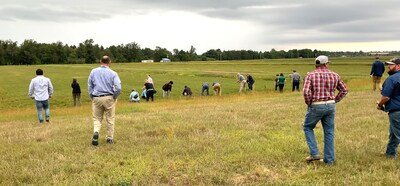During September in Wisconsin, the Weed Science Society of America (WSSA) and the National Alliance of Independent Crop Consultants (NAICC) hosted the Environmental Protection Agency (EPA), U.S. Fish and Wildlife Service (USFWS), and Natural Resource Conservation Service (NRCS) for field tours and discussions on Endangered Species Act (ESA) issues. On November 4, the WSSA will collaborate with EPA on a webinar that recaps information about ESA compliance and herbicide use, among other important environmental issues, discussed during the tour. This webinar and its recording is open to the public.
WESTMINSTER, Colo., Oct. 31, 2024 /PRNewswire-PRWeb/ -- During September in Wisconsin, the Weed Science Society of America (WSSA) and the National Alliance of Independent Crop Consultants (NAICC) hosted the Environmental Protection Agency (EPA), U.S. Fish and Wildlife Service (USFWS), and Natural Resource Conservation Service (NRCS) for field tours and discussions on Endangered Species Act (ESA) issues. On November 4, the WSSA will collaborate with EPA on a webinar that recaps information about ESA compliance and herbicide use, among other important environmental issues, discussed during the tour. This webinar and its recording is open to the public.
"A key issue and topic covered during the field training tours focused on Pesticide Use Limitation Areas or PULAs," says Greg Dahl, WSSA president. "There are multiple non-crop land options that can 'offset' herbicide strategy restrictions for farmers, crop-protection applicators and land managers, which we saw firsthand during the training." To aid those discussions, the Wisconsin tour highlighted ESA mitigations for two local ESA species: 1) the Massasauga Rattlesnake and 2) the Rusty Patched Bumble Bee.
On September 4, the tour included visits to the Great Lakes Agricultural Research Service in Delavan, the Greendale Farm near Fond du Lac, which is an NRCS demo farm, and Coloma Farms in Coloma, which grows many vegetable and root crops, but primarily potatoes. On September 5, the group toured Wetherby Cranberry marsh in Warrens, the University of Wisconsin Cranberry Research Station in Black River Falls, and Winfield United's Innovation Center in River Falls. Winfield's work on drift reduction adjuvants () contributed to DRAs being included as an ESA mitigation option in the EPA's Final Herbicide Strategy (released on August 30).
"The EPA will be hosting the ESA webinar and will record the event so that we can put it on our WSSA website," says Dahl. "We're very much looking forward to sharing with everyone what we discussed and learned on the field tours in regards to ESA compliance and mitigations."
To join the webinar on Nov. 4, at noon EST, visit this this . The webinar's goal is to train the public on best practices and technologies to preserve critical habitats for endangered species. To listen to the webinar recording after the event, select this WSSA .
To learn more about WSSA and its Endangered Species work, visit: .
About the Weed Science Society of America
The Weed Science Society of America, a nonprofit scientific society, was founded in 1956 to encourage and promote the development of knowledge concerning weeds and their impact on the environment. The Society promotes research, education and extension outreach activities related to weeds, provides science-based information to the public and policy makers, fosters awareness of weeds and their impact on managed and natural ecosystems, and promotes cooperation among weed science organizations across the nation and around the world. For more information, visit .
Media Contact
Lee Van Wychen, National & Regional Weed Science Societies, 202-746-4686, ,
SOURCE Weed Science Society of America



Share this article